Papers written by Hodgkin, Ernest P. (Doctor, b.1908 - d.1998) - Part 15
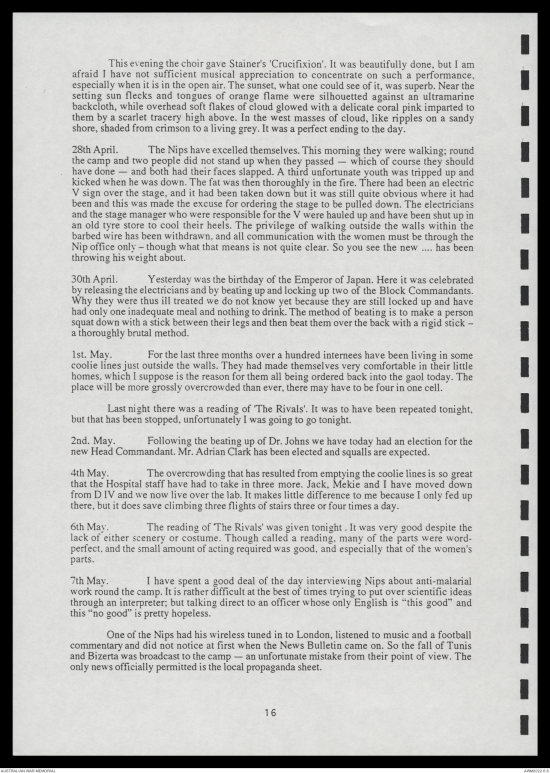
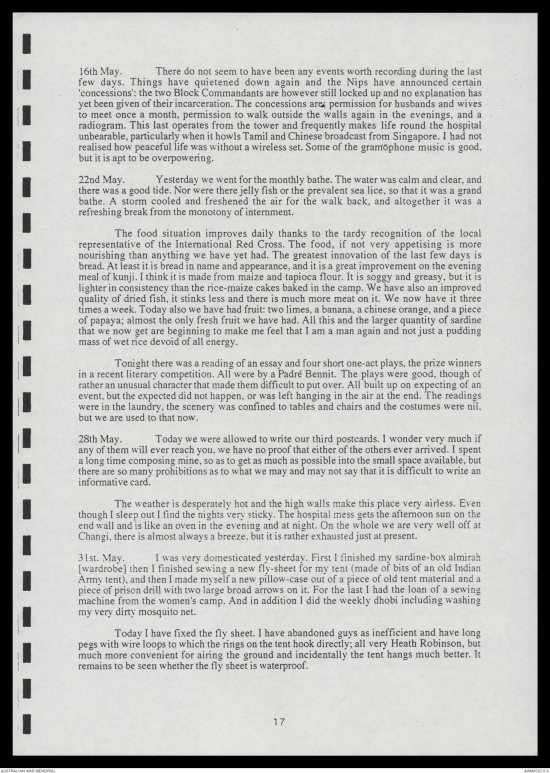
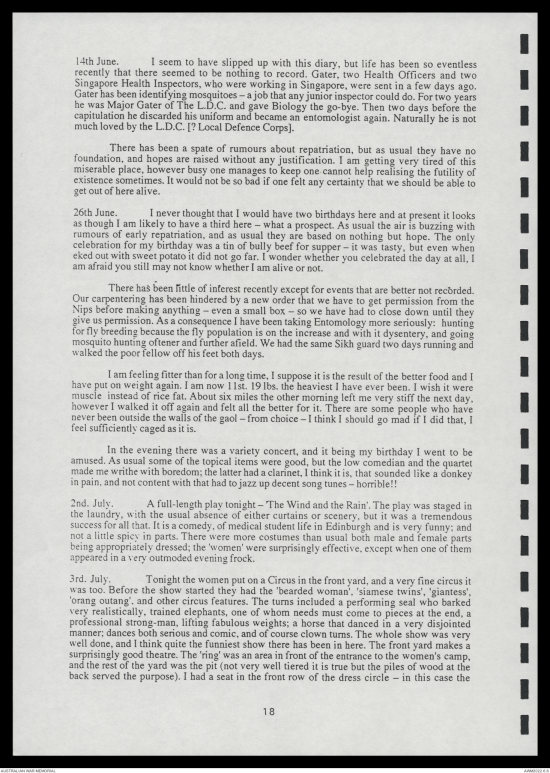
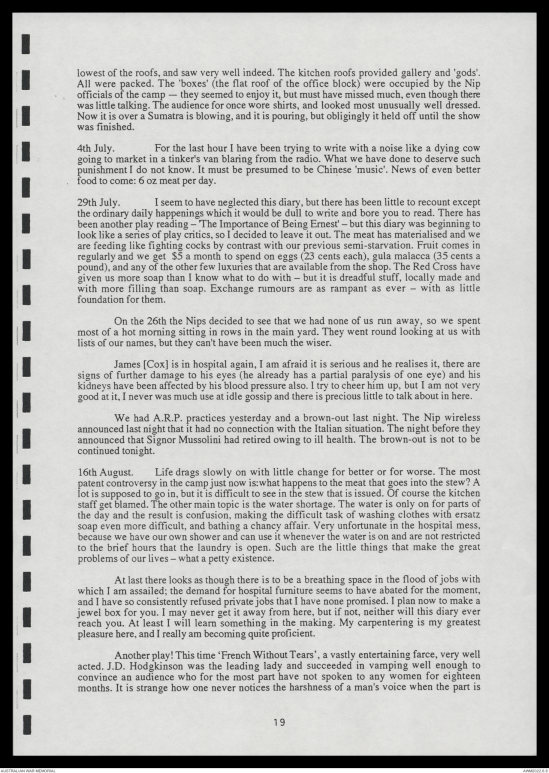
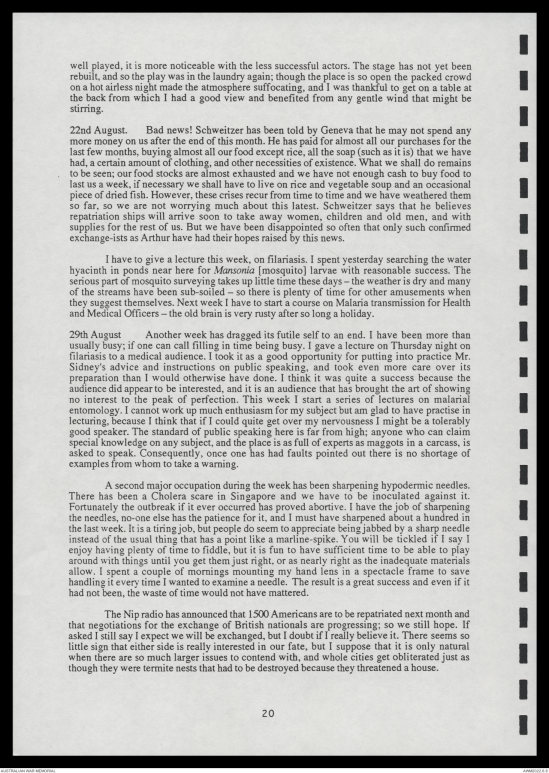
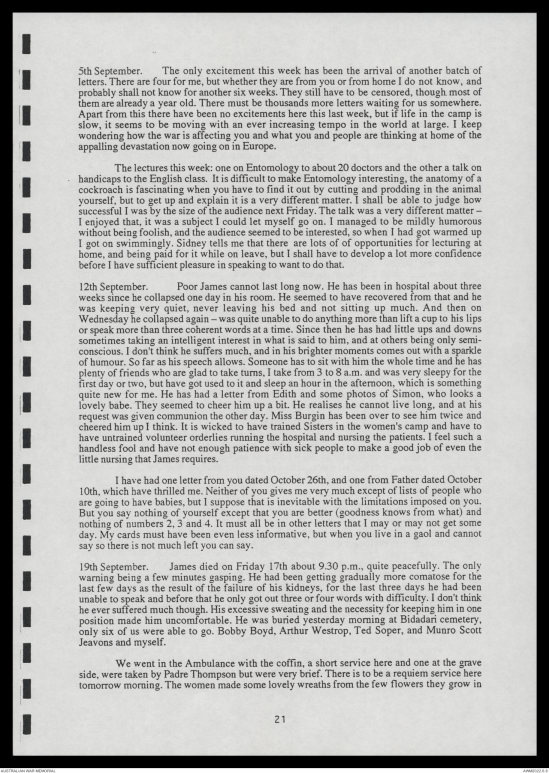
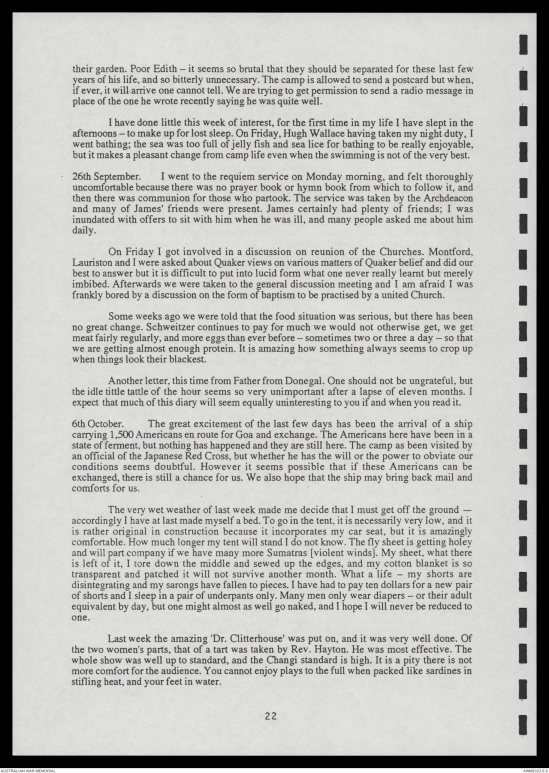
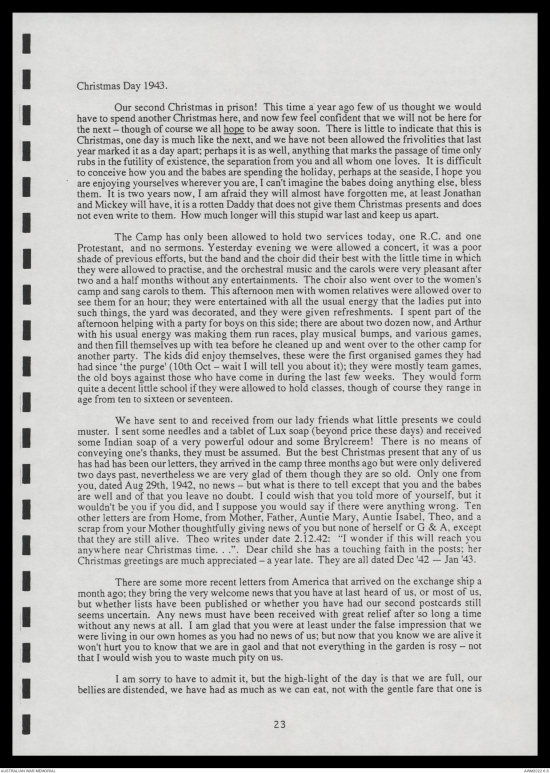
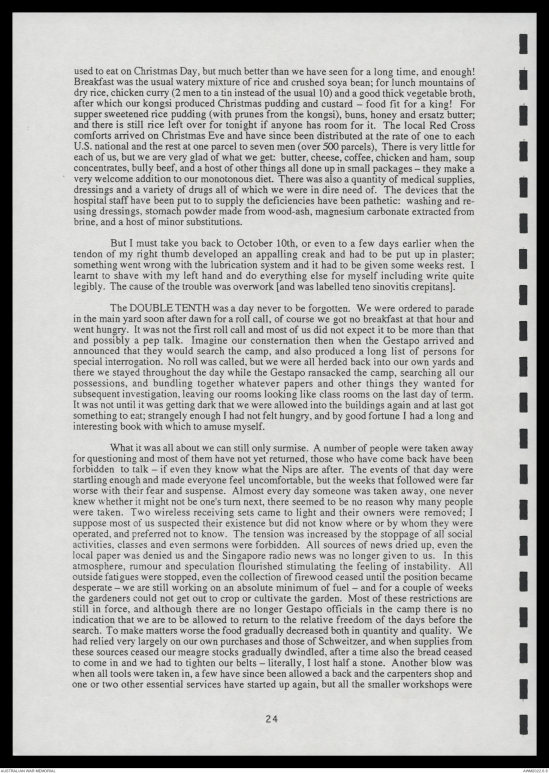
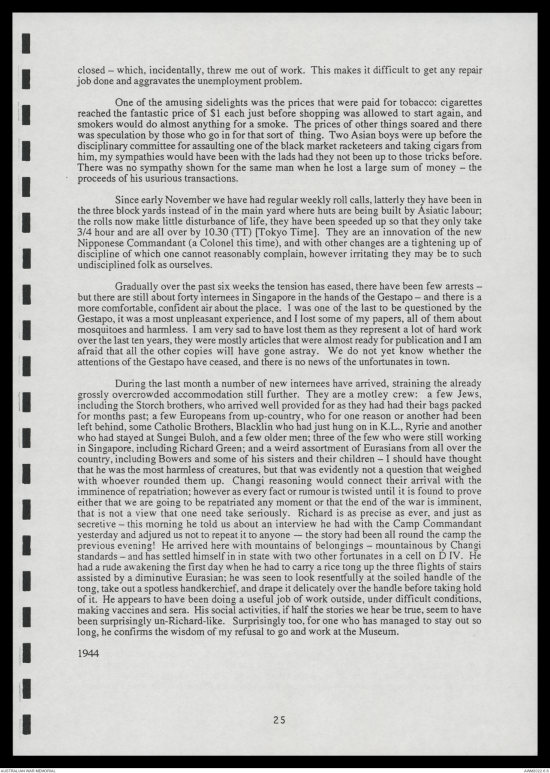
This evening the choir gave Stainer's 'Crucifixion'. It was beautifully done, but I am
afraid I have not sufficient musical appreciation to concentrate on such a performance,
especially when it is in the open air. The sunset, what one could see of it, was superb. Near the
setting sun flecks and tongues of orange flame were silhouetted against an ultramarine backcloth, while overhead soft flakes of cloud glowed with a delicate coral pink imparted to
them by a scarlet tracery high above. In the west masses of cloud, like ripples on a sandy
shore, shaded from crimson to a living grey. It was a perfect ending to the day.
28th April. The Nips have excelled themselves. This morning they were walking: round
the camp and two people did not stand up when they passed — which of course they should
have done — and both had their faces slapped. A third unfortunate youth was tripped up and
kicked when he was down. The fat was then thoroughly in the fire. There had been an electric
V sign over the stage, and it had been taken down but it was still quite obvious where it had
been and this was made the excuse for ordering the stage to be pulled down. The electricians
and the stage manager responsible for the V were hauled up and have been shut up in
an old tyre store to cool their heels. The privilege of walking outside the walls within the
barbed wire had been withdrawn, and all communication with the women must be through the
Nip office only — though what that means is not quite clear. So you see the new . . . . has been
throwing his weight about.
30th April. Yesterday was the birthday of the Emperor of Japan. Here it was celebrated
by releasing the electricians and by beating up and locking up two of the Black Commandants.
Why they were thus ill treated we do not know yet because they are still locked up and have
had only one inadequate meal and nothing to drink. The method of beating is to make a person
squat down with a stick between their legs and then beat them over the back with a rigid stick -
a thoroughly brutal method.
1st. May. For the last three months over a hundred internees have been living in some
coolie lines just outside the walls. They had made themselves very comfortable in their little
homes, which I suppose is the reason for them all being ordered back into the gaol today. The
place will be more grossly overcrowded than ever, there may have to be four in one cell.
Last night there was a reading of 'The Rivals'. It was to be repeated tonight,
but that has been stopped, unfortunately I was going to go tonight.
2nd. May. Following the beating up of Dr. Johns we have today had an election for the
new Head Commandant. Mr. Adrian Clark has been elected and squalls are expected.
4th May. The overcrowding that has resulted from emptying the collie lines is so great
that the Hospital staff have had to take in three more. Jack, Mekie and I have moved down
from DIV and we know live over the lab. It makes little difference to me because I only fed up
there, but it does save climbing three flights of stairs three or four times a day.
6th May. The reading of 'The Rivals' was given tonight. It was very good despite the
lack of either scenery or costume. Though called a reading, many of the parts were word-perfect,
and the small amount of acting required was good, and especially that of the women's
parts.
7th May. I have spent a good deal of the day interviewing Nips about anti-malarial
work around the camp. It is rather difficult at the best of times trying to put over scientific ideas
through an interpreter; but talking direct to an officer whose only English is "this good" and
this "no good" is pretty hopeless.
One of the Nips had his wireless tuned in to London, listening to music and a football
commentary and did not notice at first when a News Bulletin came on. So the fall of Tunis
and Bizerta was broadcast to the camp — an unfortunate mistake from their point of view. The
only news permitted is the local propaganda sheet.
16
16th May. There do not seem to have been any events worth recording during the last
few days. Things have quietened down again and the Nips have announced certain
'concessions'; the two Block Commandants are however still locked up and no explanation has
yet been given of their incarceration. The concessions are: permission for husbands and wives
to meet once a month, permission to walk outside the walls again in the evenings, and a
radiogram. This last operates from the tower and frequently makes life around the hospital
unbearable, particularly when it howls Tamil and Malay broadcast from Singapore. I had not
realised how peaceful life was without a wireless set.. Some of the gramophone music is good,
but it is apt to be overpowering.
22nd May. Yesterday we went for the monthly bathe. The water was calm and clear, and
there was a good tide. Nor were there jelly fish or the prevalent sea lice, so that it was a grand
bathe. A storm cooled and freshened the air for the walk back, and altogether it was a
refreshing break from the monotony of internment.
The food situation improves daily thanks to the tardy recognition of the local
representative of the International Red Cross. The food, if not very appetising is more
nourishing than anything we have yet had. The greatest innovation of the last few days is
bread. At least it is bread in name and appearance, and it is a great improvement on the evening
meal of kunji. I think it is made from maize and tapioca flour. It is soggy and greasy, but it is
lighter in consistency than the rise-maize cakes baked in the camp. We have also an improved
quality of dried fish, it stinks less and there is much more meat on it. We now have it three
times a week. Today also we have had fruit: two limes, a banana, a chinese orange, and a piece
of papaya; almost the only fresh fruit we have had. All this and a larger quantity of sardine
that we now get are beginning to make me feel that I am a man again and not just a pudding
mass of wet rice devoid of all energy.
Tonight there was a reading of an essay and four short one-act plays, the prize winners
in a recent literary competition. All were by a Padré Bennit. The plays were good, though of
rather an unusual character that made them difficult to put over. All built up on expecting of an
event, but the expected did not happen, or was left hanging in the air at the end. The readings
were in the laundry, the scenery was confined to tables and chairs and the costumes were nil,
but we are used to that now.
28th May. Today we were allowed to write our third postcards. I wonder very much if
any of them will reach you, we have no proof that either of the others ever arrived. I spent
a long time composing mine, so as to get as much as possible into the small space available, but
there are so many prohibitions as to what we may and may not say that it is difficult to write an
informative card.
The weather is desperately hot and the high walls make this place very airless. Even
though I sleep out I find the nights very sticky. The hospital mess gets the afternoon sun on the
end wall and is like an oven in the evening and at night. On the whole we are very well off at
Changi, there is almost always a breeze, but it is rather exhausted just at present.
31st. May. I was very domesticated yesterday. First I finished my sardine-box almirah
(wardrobe) then I finished sewing a new fly-sheet for my tent (made of bits of an old Indian
Army tent), and then I made myself a new pillow-case out of a piece of old tent material and a
piece of prison drill with two large broad arrows on it. For the last I had the loan of a sewing
machine from the women's camp. And in addition I did the weekly dhobi including washing
my very dirty mosquito net.
Today I have fixed the fly sheet. I have abandoned guys as inefficient and have long
pegs with wire loops to which the rings on the tent hook directly; all very Heath Robinson, but
much more convenient for airing the ground and incidentally the tent hangs much better. It
remains to be seen whether the fly sheet is waterproof.
17
14th June. I seem to have slipped up with this diary, but life has been so eventless
recently that there seemed to be nothing to record. Gater, two Health Officers and two
Singapore Health Inspectors, who were working in Singapore, were sent in a few days ago.
Gater has been identifying mosquitos — a job that any junior inspector could do. For two years
he was Major Gater of The L.D.C. and gave biology the go-bye. Then two days before the
capitulation he discarded his uniform and became an entomologist again. Naturally he is not
much loved by the L.D.C. [?Local Defence Corps].
There has been a spate of rumours about repatriation, but as usual they have no
foundation, and hopes are raise without any justification. I am getting very tired of this
miserable place, however busy one manages to keep one cannot help realising the futility of
existence sometimes. It would not be so bad if one felt any certainty that we should be able to
get out of here alive.
26th June. I never thought I would have two birthdays here and at present it looks
as though I am likely to have a third here — what a prospect. As usual the air is buzzing with
rumours of early repatriation, and as usual they are based on nothing but hope. The only
celebration for my birthday was a tin of bully beef for supper — it was tasty, but even when
eked out with sweet potato it did not go far. I wonder whether you celebrated the day at all, I
am afraid you still may not know whether I am alive or not.
There has been little of interest recently except for events that are better not recorded.
Our carpentering has been hindered by a new order that we have to get permission from the
Nips before making anything — even a small box - so we have had to close down until they
give us permission. As a consequence I have been taking entomology more seriously: hunting
for fly breeding because the fly population is on the increase and with it dysentery, and going
mosquito hunting oftener and further afield. We had the same Sikh guard two days running and
walked the poor fellow off his feet both days.
I am feeling fitter than for a long time. I suppose it is the result of the better food and I
have put on weight again. I am now 11st. 19 lbs. the heaviest I have ever been. I wish it were
muscle instead of rice fat. About six miles the other morning left me very stiff the next day,
however I walked it off again and felt all the better for it. There are some people who have
never been outside the walls of the gaol — from choice — I think I should go mad if I did that. I
feel sufficiently caged as it is.
In the evening there was a variety concert, and it being my birthday I went to be
amused. As usual some of the topical items were good, but the low comedian and the quartet
made me writhe with boredom; the latter had a clarinet, I think it is, that sounded like a donkey
in pain, and not content with that had to jazz up decent song tunes — horrible!!
2nd. July. A full-length play tonight — "The Wind and the Rain". The play was staged in
the laundry, with the usual absence of either curtain or scenery, but it was a tremendous
success for all that. It is a comedy, of medical life in Edinburgh and is very funny; and
not a little spicy in parts. There were more costumes than usual both male and female parts
being appropriately dressed; the 'women' were surprisingly effective, except when one of them
appeared in a very outmoded evening frock.
3rd. July. Tonight the women put on a Circus in the front yard, and a very fine circus it
was too. Before the show started they had the 'bearded woman', 'siamese twins', 'giantess',
'orang outang', and other circus features. The turns included a performing seal who barked
very realistically, trained elephants, one of whom needs must come to pieces at the end, a
professional strong-man, lifting fabulous weights; a horse that danced in a very disjointed
manner; dances both serious and comic, and of course clown turns. The whole show was very
well done, and I think quite the funniest show there has been in here. The front yard makes a
surprisingly good theatre. The 'ring' was an area in front of the entrance to the women's camp,
and the rest of the yard was the pit (not very well tiered it is true but the piles of wood at the
back served the purpose). I had a seat in the front row of the dress circle — in this case the
18
lowest of the roofs, and saw very well indeed. The kitchen roofs provided gallery and 'gods'.
All were packed. The 'boxes' (the flat roof of the office block) were occupied by the Nip
officials of the camp — they seemed to enjoy it, but must have missed much, even though there was little talking. The audience for once wore shirts, and looked most unusually well dressed.
Now it is over a Sumatra is blowing, and it is pouring, but it obligingly held off until the show
was finished.
4th July. For the last hour I have been trying to write with a noise like a dying cow
going to market in a tinker's van blaring from the radio. What have we done to deserve such
punishment I do not know. It must be presumed to be Chinese 'music'. News of even better
food to come: 6 oz meat per day.
29th July. I seemed to have neglected this diary, but there has been little to recount except
the ordinary daily happenings which it would be dull to write and bore you to read. There has
been another play reading — 'The Importance of Being Earnest' - but this diary was beginning to
look like a series of play critics, so I decided to leave it out. The meat has materialised and we
are feeding like fighting cocks by contrast with our previous semi-starvation. Fruit comes in
regularly and we get $5 a month to spend on eggs (23 cents each), gula malacca (35 cents a
pound), and any of the other few luxuries that are available from the shop. The Red Cross have
given us more soap than I know what to do with — but it is dreadful stuff, locally made and
with more filling than soap. Exchange rumours are as rampant as ever — with as little
foundation for them.
On the 25th the Nips decided to see that we had none of us run away, so we spent
most of a hot morning sitting in rows in the main yard. They went round looking at us with
list of our names, but they can't have been much wiser.
James [Cox] is in hospital again, I am afraid it is serious and he realises it, there are
signs of further damage to his eyes (he already has a partial paralysis of one eye) and his
kidneys have been affected by his blood pressure also. I try to cheer him up, but I am not very
good at it, I never was much use at idle gossip and there is precious little to talk about in here.
We had A.R.P. practices yesterday and a brown-out last night. The Nips wireless
announced last night that it had no connection with the Italian situation. The night before they
announced that Signor Mussolini had retired owing to ill health. The brown-out is not to be
continued tonight.
16th August. Life drags slowly on with little change for better or for worse. The most
patent controversy in the camp just now is:what happens to the meat that goes into the stew? A
lot is supposed to go in, but it is difficult to see in the stew that is issued. Of course the kitchen
staff get blamed. The other major topic is the water shortage. The water is only on for parts of
the day and the result is confusion, making the difficult task of washing clothes with ersatz
soap even more difficult, and bathing a chancy affair. Very unfortunate in the hospital mess,
because we have our own shower and can use it whenever the water is on and are not restricted
to the brief hours that the laundry is open. Such are the little things that make the great
problems of our lives — what a petty existence.
At last there looks as though there is to be a breathing space in the flood of jobs with
which I am assailed; the demand for hospital furniture seems to have abated for the moment,
and I have so consistently refused private jobs that I have none promised. I plan now to make a
jewel box for you. I may never get it away from here, but if not, neither will this diary ever
reach you. At least I will learn something in the making. My carpentering is my greatest
pleasure here, and I really am becoming quite proficient.
Another play! This time 'French Without Tears', a vastly entertaining farce, very well
acted. J.D. Hodgkinson was the leading lady and succeeded in vamping well enough to
convince an audience who for the most part have not spoken to any women for eighteen
months. It is strange how one never notices the harshness of a man's voice when the part is
19
well played, it is more noticeable with the less successful actors. The stage has not yet been
rebuilt, and so the play was in the laundry again; though the place is so open the packed crowd
on a hot airless night made the atmosphere suffocating, and I was thankful to get on a table at
the back from which I had a good view and benefited from any gentle wind that might be
stirring.
22nd August. Bad news! Schweitzer has been told by Geneva that he may not spend any
more money on us after the end of this month. He has paid for almost all our purchases for the
last few months, buying almost all our food except rice, all the soap (such as it is) that we have
had, a certain amount of clothing, and other necessities of existence. What we shall do remains
to be seen; our food stocks are almost exhausted and we have not enough cash to buy food to
last us a week, if necessary we shall have to live on rice and vegetable soup and on an occasional
piece of dried fish. However, these cries recur from time to time and we have weathered them
so far, so we are not worrying much about this latest. Schweitzer says that he believes
repatriation ships will arrive soon to take away women, children and old men, and with
supplies for the rest of us. But we have been disappointed so often that only such confirmed
exchanges-ists as Arthur have had their hopes raised by the news.
I have to give a lecture this week on filariasis. I spent yesterday searching the water
hyacinth in ponds near here for Monsonia (mosquito) larvae with with reasonable success. The
serious part of mosquito surveying takes up little time these days — the weather is dry and many
of the streams have been sub — soiled — so there is plenty of time for other amusements when
they suggest themselves. Next week I have to start a course on Malaria transmission for Health
and Medical Officers — the old brain is very rusty after so long a holiday.
29th August Another week has dragged its futile self to an end. I have been more than
usually busy: if one can call filling in time being busy. I gave a lecture on Thursday night on
filariasis to a medical audience. I took it as a good opportunity for putting into practice Mr.
Sidney's advice and instructions on public speaking, and took even more care over its
preparation than I would otherwise have done. I think it was quite a success because the
audience did appear to be interested, and it is an audience that has brought the art of showing
no interest to the peak of perfection. This week I start a series of lectures on malarial
entomology. I cannot work up much enthusiasm for my subject but am glad to have practise in
lecturing, because I think that if I could quite get over my nervousness I might be a tolerably
good speaker. The standard of public speaking here is far from high: anyone who can claim
special knowledge on any subject, and the place is as full of experts as maggots in a carcass, is
asked to speak. Consequently, once one has had faults pointed out there is no shortage of
examples from whom to take a warning.
A second major occupation during the week has been sharpening hypodermic needles.
There has been a Cholera scare in Singapore and we have to be inoculated against it.
Fortunately the outbreak if it every occurred has proved abortive. I have the job of sharpening
the needles, no-one else has the patience for it, and I must have sharpened about a hundred in
the last week. It is a tiring job, but people do seem to appreciate being jabbed by a sharp needle
instead of the usual thing that has a point like a marline-spike. You will be tickled if I say I
enjoy having plenty of time to fiddle, but it fun to have sufficient time to be able to play
around with things until you get them just right, or as nearly right as the inadequate materials
allow. I spent a couple of mornings mounting my hand lens in a spectacle frame to save
handling it every time I wanted to examine a needle. The result is a great success and even if it
had not been, the waste of time would not have mattered.
The Nip radio has announced that 1500 Americans are to be repatriated next month and
that negotiations for the exchange of British nationals are progressing; so we still hope. If
asked I still say I expect we will be exchanged, but I doubt if I really believe it. There seems so
little sign that either side is really interested in our fate, but I suppose that it is only natural
when there are so much larger issues to contend with, and whole cities get obliterated just as
though they were termite nests that had to be destroyed because they threatened a house.
20
5th September. The only excitement this week has been the arrival of another batch of
letters. There are four for me, but whether they are from you or from home I do not know, and
probably shall not know for another six weeks. They still have to be censored, though most of
them are already a year old. There must be thousands more letters waiting for us somewhere.
Apart from this there have been no excitements here this last week, but if life in the camp is
slow, it seems to be moving with an ever increasing tempo in the world at large. I keep
wondering how the war is affecting you and what you and people are thinking at home of the
appalling devastation now going on in Europe.
The lectures this week: one on Entomology to about 20 doctors and the other a talk on
handicaps to the English class. It is difficult to make Entomology interesting, the anatomy of a
cockroach is fascinating when you have to find it out by cutting and prodding in the animal
yourself, but to get up and explain it is a very different matter. I shall be able to judge how
successful I was by the size of the audience next Friday. The talk was a very different matter —
I enjoyed that, it was a subject I could let myself go on. I managed to be mildly humorous
without being foolish, and the audience seemed to be interested, so when I had got warmed up
I got on swimmingly. Sidney tells me that there are lots of of opportunities for lecturing at
home, and being paid for it while on leave, but I shall have to develop a lot more confidence
before I have sufficient pleasure in speaking to want to do that.
12th September. Poor James cannot last long now. He has been in hospital about three
weeks since he collapsed one day in his room. He seemed to have recovered from that and he
was keeping very quiet, never leaving his bed and not sitting up much. And then on
Wednesday he collapsed again — was quite unable to do anything more than lift a cup to his lips
or speak more than three coherent words at a time. Since then he has had little ups and downs
sometimes taking an intelligent interest in what is said to him, and at others being only semi-conscious.
I don't think he suffers much, and in his brighter moments comes out with a sparkle
of humour. So far as his speech allows. Someone has to sit with him the whole time and he has
plenty of friends who are glad to take turns. I take from 3 to 8 a.m. and was very sleepy for the
first day or two, but have got used to it and sleep an hour in the afternoon, which is something
quite new for me. He has had a letter from Edith and some photos of Simon, who looks a
lovely babe. They seemed to cheer him up a bit. He realises he cannot live long, and at his
request was given communion the other day. Miss Burgin has been over to see him twice and
cheered him up I think. It is wicked to have trained Sisters in the women's camp and have to
have untrained volunteer orderlies running the hospital and nursing the patients. I feel such a
handless fool and have not enough patience with sick people to make a good job of even the
little nursing that James requires.
I have had one letter from you dated October 26th, and one from Father dated October
10th, which have thrilled me. Neither of you gives me very much except of lists of people who
are going to have babies, but I suppose that is inevitable with the limitations imposed on you.
But you say nothing of yourself except that you are better (goodness knows from what) and
nothing of numbers 2, 3 and 4. It must all be in other letters that I may or may not get some
day. My cards must have been even less informative, but when you live in a gaol and cannot
say so there is not much left you can say.
19th September. James died on Friday 17th about 9.30 p.m., quite peacefully. The only
warning being a few minutes gasping. He had been getting gradually more comatose for the
last few days as the result of the failure of his kidneys, for the last three days he had been
unable to speak and before that he only got out three or four words with difficulty. I don't think
he ever suffered much though. His excessive sweating and the necessity for keeping him in one
position made him uncomfortable. He was buried yesterday morning at Bidadari cemetery,
only six of us were able to go. Bobby Boyd, Arthur Westrop, Ted Soper, and Munro Scott
Jeavons and myself.
We went in the Ambulance with the coffin, a short service here and one at the grave
side, were taken by Padre Thompson but were very brief. There is to be a requiem service here
tomorrow morning. The women made some lovely wreaths from the few flowers they grow in
21
their garden. Poor Edith — it seems so brutal that they should be separated for these last few
years of his life, and so bitterly unnecessary. The camp is allowed to send a postcard but when,
if ever, it will arrive one cannot tell. We are trying to get permission to send a radio message in
place of the one he wrote recently saying he was quite well.
I have done little this week of interest, for the first time in my life I have slept in the
afternoons — to make up for lost sleep. On Friday, Hugh Wallace having taken my night duty, I
went bathing; the sea was too full of jelly fish and sea lice for bathing to be really enjoyable,
but it makes a pleasant change from camp life even when the swimming is not of the very best.
26th September. I went to the requiem service on Monday morning, and felt thoroughly
uncomfortable because there was no prayer book or hymn book from which to follow it, and
then there was communion for those who partook. The service was taken by the Archdeacon
and many of James' friends were present. James certainly had plenty of friends; I was
inundated with offers to sit with him when he was ill, and many people asked me about him
daily.
On Friday I got involved in a discussion on reunion of the Churches. Montford,
Lauriston and I were asked about Quaker views on various matters of Quaker belief and did our
best to answer but it is difficult to put into lucid form what one never really leant but merely
imbibed. Afterwards we were taken to the general discussion meeting and I am afraid I was
frankly bored by a discussion on the form of baptism to be practised by a united Church.
Some weeks ago we were told that the food situation was serious, but there has been
no great change. Schweitzer continues to pay for much we would not otherwise get, we get
meat fairly regularly, and more eggs than ever before — sometimes two or three a day — so that
we are getting almost enough protein. It is amazing how something always seems to crop up
when things look their blackest.
Another letter, this time from Father from Donegal. One should not be ungrateful, but
the idle tittle tattle of the hour seems so very unimportant after a lapse of eleven months. I
expect that much of this diary will seem equally uninteresting to you if and when you read it.
9th October. The great excitement of the last few days has been the arrival of a ship
carrying 1,500 Americans en route for Goa and exchange. The Americans here have been in a
state of ferment, but nothing has happened and they are still here. The camp has been visited by
an official of the Japanese Red Cross, but whether he has the will or the power to obviate our
conditions seems doubtful. However it seems possible that if these Americans can be
exchanged, there is still a chance for us. We also hope that the ship may bring back mail and
comforts for us.
The very wet weather of last week made me decide that I must get off the ground —
accordingly I have at last made myself a bed. To go in the tent, it is necessarily very low, and it
is rather original in construction because it incorporates my car seat, but it is amazingly
comfortable. How much longer my tent will stand I do not know. The fly sheet is getting holey
and will part company if we have many more Sumatras [violent winds). My sheet, what there
is left of it, I tore down the middle and sewed up the edges, and my cotton blanket is so
transparent and patched it will not survive another month. What a life — my shorts are
disintegrating and my sarongs have fallen to pieces. I have had to pay ten dollars for a new pair
of shorts and I sleep in a pair of underpants only. Many men only wear diapers — or their adult
equivalent by day, but one might almost as well go naked, and I hope I will never be reduced to
one.
Last week the amazing ‘Dr. Clitterhouse' was put on, and it was very well done. Of
the two women's parts, that of a tart was taken by Rev. Hayton. He was most effective. The
whole show was well up to standard, and the Changi standard is high. It is a pity there is not
more comfort for the audience. You cannot enjoy plays to the full when packed like sardines in
stifling heat, and your feet in water.
22
Christmas Day 1943. Our second Christmas in prison! This time a year ago few of us thought we would
have to spend another Christmas here, and now few feel confident that we will not be here for
the next — though of course we all hope to be away soon. There is little to indicate that this is
Christmas, one day is much like the next, and we have not been allowed the frivolities that last
year marked it as a day apart; perhaps it is as well, anything that marks the passage of time only
rubs in the futility of existence, the separation from you and all whom one loves. It is difficult
to conceive how you and the babes are spending the holiday, perhaps at the seaside, I hope you
are enjoying yourselves wherever you are, I can't imagine the babes doing anything else, bless
them. It is two years now. I am afraid they will almost have forgotten me, at least Jonathan
and Mickey will have, it is a rotten Daddy that does not give them Christmas presents and does
not even write to them. How much longer will this stupid war last and keep us apart.
The Camp has only been allowed to hold two services today, one R.C. and one
Protestant, and no sermons. Yesterday evening we were allowed a concert, it was a poor
shade of previous efforts, but the band and the choir did their best with the little time in which
they were allowed to practise, and the orchestral music and the carols were very pleasant after
two and a half months without any entertainments. The choir also went over to the women's
camp and sang carols to them. This afternoon men with women relatives were allowed over to
see them for an hour; they were entertained with all the usual energy that the ladies put into
such things, the yard was decorated, and they were given refreshments. I spent part of the
afternoon helping with a party for boys on this side; there are about two dozen now, and Arthur
with his usual energy was making them run races, play musical bumps, and various games,
and then fill themselves up with tea before he cleaned up and went over to the other camp for
another party. The kids did enjoy themselves, these were the first organised games they had
had since 'the purge' (10th Oct — wait I will tell you about it); they were mostly team games,
the old boys against those who have come in during the last few weeks. They would form
quite a decent little school if they were allowed to hold classes, though of course they range in
age from ten to sixteen or seventeen.
We have sent to and received from our lady friends what little presents we could
muster. I sent some needles and a tablet of Lux soap (beyond price these days) and received
some Indian soap of a very powerful odour and some Brylereem! There is no means of
conveying one's thanks, they must be assumed. But the best Christmas present that any of us
has had has been our letters, they arrived in the camp three months ago but were only delivered
two days past, nevertheless we are very glad of them though they are so old. Only one from
you, dated Aug 29th. 1942, no news — but what is there to tell except that you and the babes
are well and of that you leave no doubt. I could wish that you told more of yourself, but it
wouldn't be you if you did, and I suppose you would say if there were anything wrong. Ten
other letters are from Home, from Mother, Father, Auntie Mary, Auntie Isabel, Theo, and a
scrap from your Mother thoughtfully giving news of you but none of herself or G & A. except
that they are still alive. Theo writes under date 2.12.42: "I wonder if this will reach you
anywhere near Christmas time...". Dear child she has a touching faith in the posts; her
Christmas greetings are much appreciated — a year late. They are all dated Dec '42 — Jan 43.
There are some more recent letters from America that arrived on the exchange ship a
month ago: they bring the very welcome news that you have at last heard of us, or most of us,
but whether lists have been published or whether you have had our second postcards still
seems uncertain. Any news must have been received with great relief after so long a time
without any news at all. I am glad that you were at least under the false impression that we
were living in our own homes as you had no news of us; but now that you know we are alive it
won't hurt you to know that we are in gaol and that not everything in the garden is rosy — not
that I would wish you to waste much pity on us.
I am sorry to have to admit it, but the high-light of the day is that we are full, our
bellies are distended, we have had as much as we can eat, not with the gentle fare that one is
23
used to eat on Christmas Day, but much better than we have seen for a long time, and enough!
Breakfast was the usual watery mixture of rice and crushed soya bean; for lunch mountains of
dry rice, chicken curry (2 men to a tin instead of the usual 10) and a good thick vegetable broth,
after which our kongsi produced Christmas pudding and custard — food fit for a king! For
supper sweetened rice pudding (with prunes from the kongsi), buns, honey and ersatz butter;
and there is still rice left over for tonight if anyone has room for it. The local Red Cross
comforts arrived on Christmas Eve and have since been distributed at the rate of one to each
U.S. national and the rest at one parcel to seven men (over 500 parcels). There is very little for
each of us, but we are very glad of what we get: butter, cheese, coffee, chicken and ham, soup
concentrates, bully beef, and a host of other things all done up in small packages — they make a
very welcome addition to our monotonous diet. There was also a quantity of medical supplies,
dressings and a variety of drugs all of which we were in dire need of. The devices that the
hospital staff have been put to to supply the deficiencies have been pathetic: washing and reusing
dressings, stomach powder made from wood-ash, magnesium carbonate extracted from
brine, and a host of minor substitutions.
But I must take you back to October 10th, or even to a few days earlier when the
tendon of my right thumb developed an appalling creak and had to be put up in plaster:
something went wrong with the lubrication system and it had to be given some weeks rest. I
learnt to shave with my left hand and do everything else for myself including write quite
legibly. The cause of the trouble was overwork (and was labelled teno sinovitis crepitans].
The DOUBLE TENTH was a day never to be forgotten. We were ordered to parade
in the main yard soon after dawn for a roll call, of course we got no breakfast at that hour and
went hungry. It was not the first roll call and most of us did not expect it to be more than that
and possibly a pep talk. Imagine our consternation then when the Gestapo arrived and
announced that they would search the camp, and also produced a long list of persons for
special interrogation. No roll was called, but we were all herded back into our own yards and
there we stayed throughout the day while the Gestapo ransacked the camp, searching all our
possessions, and bundling together whatever papers and other things they wanted for
subsequent investigation, leaving our rooms looking like class rooms on the last day of term.
It was not until it was getting dark that we were allowed into the buildings again and at last got
something to eat; strangely enough I had not felt hungry, and by good fortune I had a long and
interesting book with which to amuse myself.
What it was all about we can still only surmise. A number of people were taken away
for questioning and most of them have not yet returned, those who have come back have been
forbidden to talk — if even they know what the Nips are after. The events of that day were
startling enough and made everyone feel uncomfortable, but the weeks that followed were far
worse with their fear and suspense. Almost every day someone was taken away, one never
knew whether it might not be one's turn next, there seemed to be no reason why many people
were taken. Two wireless receiving sets came to light and their owners were removed; I
suppose most of us suspected their existence but did not know where or by whom they were
operated, and preferred not to know. The tension was increased by the stoppage of all social
activities, classes and even sermons were forbidden. All sources of news dried up, even the
local paper was denied us and the Singapore radio news was no longer given to us. In this
atmosphere, rumour and speculation flourished stimulating the feeling of instability. All
outside fatigues were stopped, even the collection of firewood ceased until the position became
desperate — we are still working on an absolute minimum of fuel — and for a couple of weeks
the gardeners could not get out to crop or cultivate the garden. Most of these restrictions are
still in force, and although there are no longer Gestapo officials in the camp there is no
indication that we are to be allowed to return to the relative freedom of the days before the
search. To make matters worse the food gradually decreased both in quantity and quality. We
had relied very largely on our own purchases and those of Schweitzer, and when supplies from
these sources ceased our meagre stocks gradually dwindled, after a time also the bread ceased
to come in and we had to tighten our belts — literally, I lost half a stone. Another blow was
when all tools were taken in, a few have since been allowed a back and the carpenters shop and
one or two other essential services have started up again, but all the smaller workshops were
24
closed — which, incidentally, threw me out of work. This makes it difficult to get any repair
job done and aggravates the unemployment problem.
One of the amusing sidelights was the prices that were paid for tobacco: cigarettes
reached the fantastic price of S1 each just before shopping was allowed to start again, and
smokers would do almost anything for a smoke. The prices of other things soared and there
was speculation by those who go in for that sort of thing. Two Asian boys were up before the
disciplinary committee for assaulting one of the black market racketeers and taking cigars from
him, my sympathies would have been with the lads had they not been up to those tricks before.
There was no sympathy shown for the same man when he lost a large sum of money — the
proceeds of his usurious transactions.
Since early November we have had regular weekly roll calls, latterly they have been in
the three block yards instead of in the main yard where huts are being built by Asiatic labour;
the rolls now make little disturbance of life, they have been speeded up so that they only take
3/4 hour and are all over by 10.30 (TT) [Tokyo Time]. They are an innovation of the new
Nipponese Commandant (a Colonel this time), and with other changes are a tightening up of
discipline of which one cannot reasonably complain, however irritating they may be to such
undisciplined folk as ourselves.
Gradually over the past six weeks the tension has eased, there have been few arrests —
but there are still about forty internees in Singapore in the hands of the Gestapo — and there is a
more comfortable, confident air about the place. I was one of the last to be questioned by the
Gestapo, it was a most unpleasant experience, and I lost some of my papers, all of them about
mosquitoes and harmless. I am very sad to have lost them as they represent a lot of hard work
over the last ten years, they were mostly articles that were almost ready for publication and I am
afraid that all the other copies will have gone astray. We do not yet know whether the
attentions of the Gestapo have ceased, and there is no news of the unfortunates in town.
During the last month a number of new internees have arrived, straining the already
grossly overcrowded accommodation still further. They are a motley crew: a few Jews,
including the Storch brothers, who arrived well provided for as they had had their bags packed
for months past; a few Europeans from up-country, who for one reason or another had been
left behind, some Catholic Brothers, Blacklin who had just hung on in K.L., Ryrie and another
who had stayed at Sungei Buloh, and a few older men; three of the few who were still working
in Singapore, including Richard Green; and a weird assortment of Eurasians from all over the
country, including Bowers and some of his sisters and their children — I should have thought
that he was the most harmless of creatures, but that was evidently not a question that weighed
with whoever rounded them up. Changi reasoning would connect their arrival with the
imminence of repatriation; however as every fact or rumour is twisted until it is found to prove
either that we are going to be repatriated any moment or that the end of the war is imminent,
that is not a view that one need take seriously. Richard is as precise as ever, and just as
secretive — this morning he told us about an interview he had with the Camp Commandant
yesterday and adjured us not to repeat it to anyone — the story had been all round the camp the
previous evening! He arrived here with mountains of belongings — mountainous by Changi
standards — and has settled himself in in state with two other fortunates in a cell on D IV. He
had a rude awakening the first day when he had to carry a rice tong up the three flights of stairs
assisted by a diminutive Eurasian: he was seen to look resentfully at the soiled handle of the
tong, take out a spotless handkerchief, and drape it delicately over the handle before taking hold
of it. He appears to have been doing a useful job of work outside, under difficult conditions,
making vaccines and sera. His social activities, if half the stories we hear be true, seem to have
been surprisingly un-Richard-like. Surprisingly too, for one who has managed to stay out so
long, he confirms the wisdom of my refusal to go and work at the Museum.
1944
25
 Sam scott
Sam scottThis transcription item is now locked to you for editing. To release the lock either Save your changes or Cancel.
This lock will be automatically released after 60 minutes of inactivity.